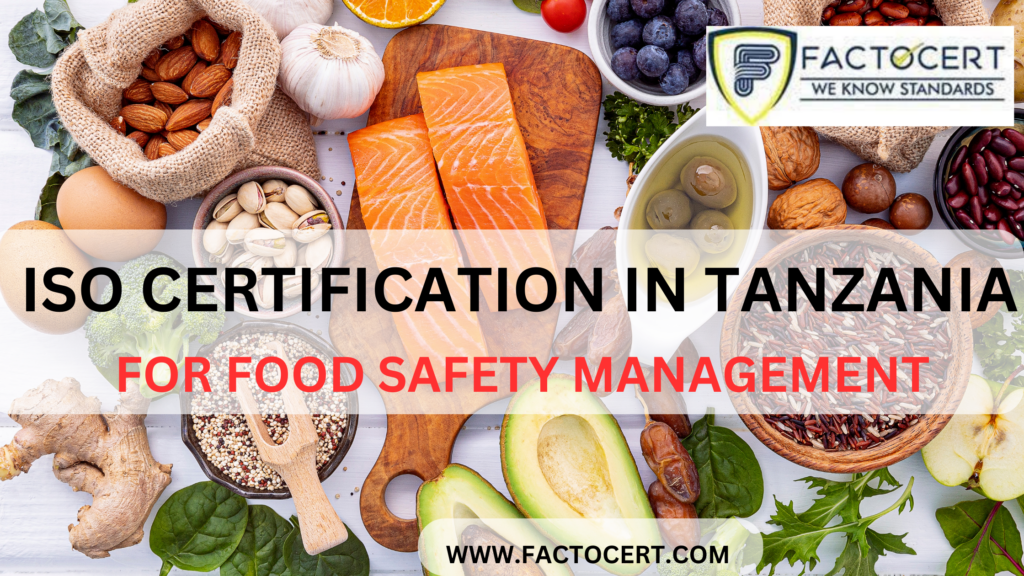ISO Certification in Tanzania, ISO-certified foods are often regarded as more secure in Tanzania and around the globe due to many factors. The International Organization for Standardization (ISO) certification ensures that certain food items adhere to rigorous quality and safety criteria, instilling confidence in customers, regulatory entities, and enterprises. ISO certification in Tanzania is highly advantageous for managing food safety, with ISO 22000 being the primary certification that aids in this aspect.
This article will explain why ISO-certified foods in Tanzania are safer, with a focus on the important part that ISO 22000 Certification in Tanzania plays.
- The adherence to international standards, such as ISO standards, particularly ISO 22000, has global recognition and commands widespread respect. When a food product obtains ISO certification in Tanzania, it signifies that it adheres to internationally recognized criteria about the safety and quality of food. The provision of this guarantee has significant value for consumers and local and international trade partners.
- Stringent quality control techniques are integral to ISO certification in Tanzania, ensuring adherence to rigorous standards. Food goods that display the ISO mark have undergone comprehensive testing, inspection, and monitoring at all production and supply chain stages. This thorough process ensures that these products meet stringent quality and safety requirements.
- The primary emphasis is on food safety management: ISO 22000 is a standard specially developed to address the requirements of food safety management systems. The framework offers a systematic approach for Tanzanian companies to efficiently identify, manage, and reduce food safety issues, decreasing the likelihood of contamination and foodborne diseases.
- ISO 22000 advocates for adopting a risk-based strategy to ensure food safety. In Tanzania, organizations must evaluate possible food safety hazards, establish and enforce control measures, and consistently evaluate and enhance their operational procedures to mitigate such risks.
- ISO-certified goods frequently incorporate comprehensive traceability systems. This implies that the traceability of materials and manufacturing processes may be readily monitored, facilitating prompt recalls and inquiries into safety issues or contamination.
- Process optimization is a crucial aspect of the implementation of ISO 22000 Certification in Tanzania. This entails a thorough analysis and subsequent enhancement of food production processes. Such optimization efforts have the potential to yield significant benefits, including cost reduction, heightened operational efficiency, and diminished waste generation. The implementation of this measure guarantees the efficient utilization of resources.
- ISO 22000 mandates that enterprises must provide training and cultivate awareness among their personnel about food safety. This practice guarantees that all individuals within the business possess a comprehensive comprehension of their respective responsibilities in upholding the established food safety standards.
- ISO 22000 demonstrates adherence to regulatory mandates in Tanzania and several other nations. Hence, foods that have obtained ISO certification in Tanzania are more inclined to adhere to domestic and international norms and legislation about food safety.
- The use of ISO certification in Tanzania fosters customer confidence. Consumers have a higher propensity to place faith in and select products with the ISO certification mark, as it indicates a steadfast dedication to upholding food safety and quality standards.
- Market access is sometimes contingent upon retailers and export markets demanding ISO certification as a fundamental need for engaging in commercial activities. The acquisition of ISO 22000 certification in Tanzania has the potential to facilitate the exploration of novel markets and export prospects for food enterprises operating in Tanzania.
- Continuous improvement is a crucial focus of ISO standards. Organizations that hold ISO certification in Tanzania engage in periodic evaluations and enhancements of their operational procedures to uphold and increase food safety and quality standards.
What are the reasons for selecting Factocert as Tanzania’s preferred choice for ISO certification in Tanzania?
Factocert is a leading ISO consultant in Tanzania, providing exceptional proficiency in ISO certification services. The company’s dedication to achieving high standards of quality and meeting the needs of its clients positions it as the chosen option for businesses needing ISO certification.
Factocert is a prominent provider of ISO Certification services in Tanzania, occupying a leadership position in the industry. Our company offers top-quality ISO Consultant services in several main cities of Tanzania, including Dar es Salaam, Mwanza, Dodoma, Mbeya, Moshi, and Morogoro. These services encompass implementation, training, auditing, and registration. We provide a range of ISO Standards, including ISO 27001, ISO 9001, ISO 14001, ISO 13485, ISO 22000, ISO 17025, ISO 45001, and more.
Conclusion:
Foods that have obtained ISO certification in Tanzania are considered to possess enhanced security measures, mainly attributed to implementing extensive and globally acknowledged standards and processes associated with ISO certification. ISO 22000 expressly assumes a crucial role in facilitating the management of food safety in Tanzania by offering a well-organized framework for identifying and mitigating hazards related to food safety, guaranteeing adherence to regulations, and fostering confidence among consumers.
The attainment of ISO Certification in Tanzania indicates the commitment to conforming to global standards across many industries, encompassing quality management, environmental stewardship, and information security. Implementing this strategy promotes competitiveness, improves the quality of products and services, and assures adherence to regulatory requirements. Businesses, government agencies, and organizations seek ISO certification to showcase their dedication to achieving high standards, enhancing their reputation, and facilitating international commerce.
For information visit: ISO Certification in Tanzania





